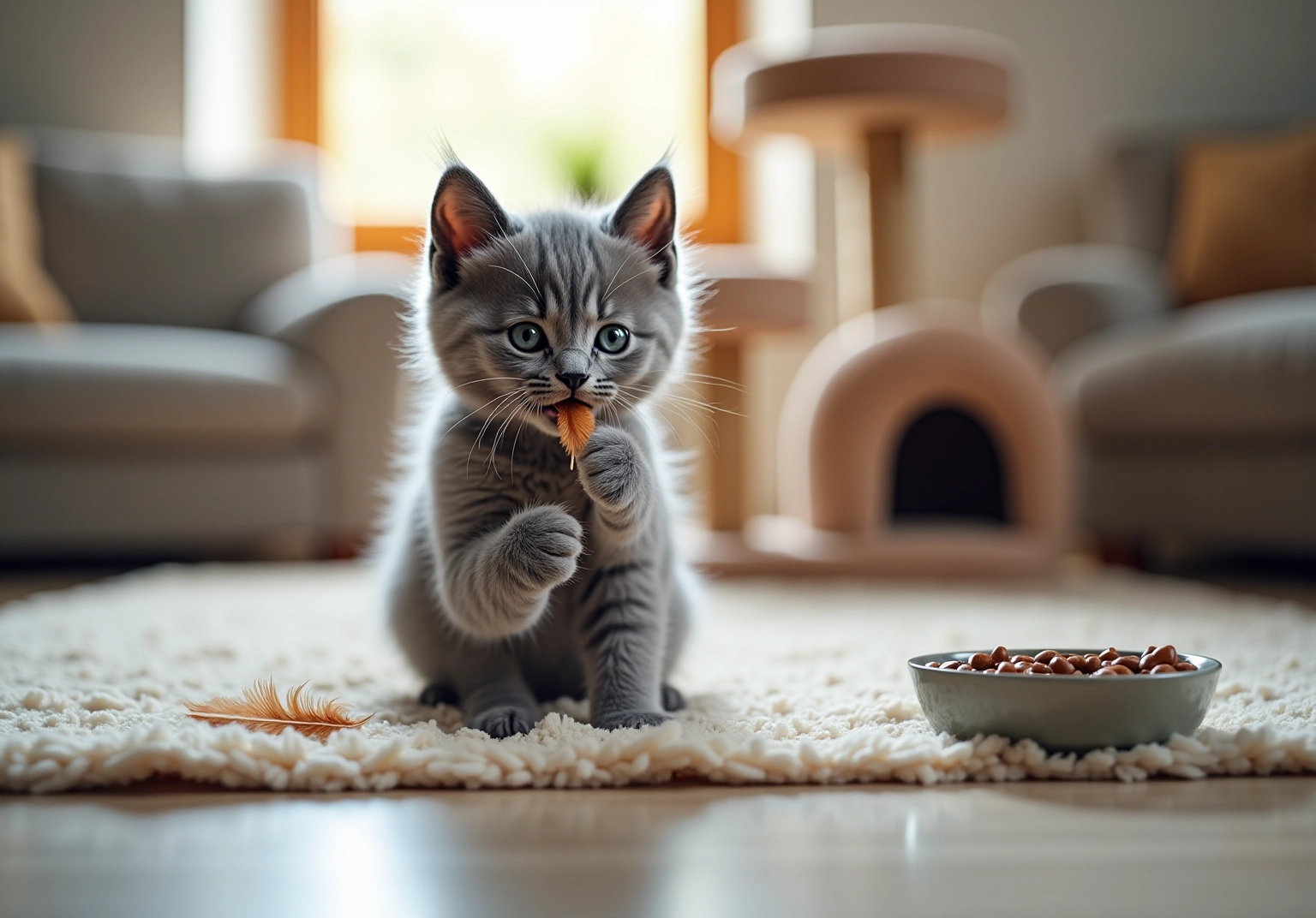
4 Essential Steps for Caring for Your Russian Blue Kitten
Overview
Caring for a Russian Blue kitten requires a deep understanding of their unique temperament and needs. As a loving pet owner, you may feel overwhelmed by the responsibility of providing the best care possible. It’s essential to ensure they receive:
- A proper diet
- Regular socialization and exercise
- Routine veterinary care
By focusing on these vital aspects, you can help your kitten thrive in a nurturing environment.
Understanding the grooming requirements of Russian Blue kittens is crucial, as their stunning coat needs regular attention to keep it healthy and beautiful. Additionally, these kittens thrive on high-quality food that meets their dietary preferences, which can contribute to their overall well-being. Remember, playtime and socialization are not just fun; they are also key to reducing anxiety and fostering a strong bond between you and your furry friend.
Lastly, scheduling regular health check-ups is a loving gesture that allows you to monitor your kitten’s well-being closely. It’s a proactive step that shows your commitment to their health and happiness. By embracing these essential steps, you are not only addressing the needs of your Russian Blue kitten but also nurturing a loving relationship that will last a lifetime.
Introduction
Caring for a Russian Blue kitten involves more than just affection; it requires a deep understanding of their unique needs and characteristics. These delightful felines, celebrated for their gentle temperament and striking appearance, flourish when their specific requirements are met. Yet, many new pet owners may find themselves wondering: what essential steps can ensure their Russian Blue kitten grows into a happy and healthy adult? This guide explores the vital aspects of care, from dietary considerations to socialization practices, offering insights that empower owners to nurture their furry companions with love and confidence.
Understand the Unique Needs of Russian Blue Kittens
Russian blue kittens are truly cherished for their gentle and affectionate nature. However, they have unique needs that must be met to ensure their happiness and well-being. As a loving pet owner, it’s essential to consider these important aspects of their care:
-
Temperament: These sweet souls are typically calm and reserved, forming deep bonds with their owners. They may feel shy around new faces, so introducing them gradually to new people and environments can help them feel more at ease.
-
Grooming: Their luxurious double coat deserves regular brushing to prevent matting and keep it healthy. Aim for at least weekly brushing, and increase the frequency during shedding seasons to maintain their beautiful coat. Fortunately, a Russian Blue kitten requires minimal grooming, making it a great choice for busy pet owners.
-
Socialization: Early socialization plays a crucial role in their development. Exposing your kitten to various sounds, people, and other pets helps them grow into well-adjusted adults. Since they can be prone to anxiety, providing a stable and calm environment is particularly beneficial. Gradually introducing them to new experiences and using positive reinforcement can lead to wonderful outcomes.
-
Playfulness: While they enjoy playtime, a Russian Blue kitten is not excessively energetic. Providing engaging toys and interactive play sessions can stimulate their minds and bodies without overwhelming them. This balance is vital for their happiness and overall well-being. It’s also important to monitor their diet and exercise, as one out of every three cats in the United States faces the risk of being overweight or obese, which can lead to health issues.
-
Nutritional Needs: To support your feline’s growth and development, ensure they receive a high-quality, age-appropriate diet. Consulting with a veterinarian can offer tailored dietary recommendations that meet their specific needs. Remember, the love and care you provide are instrumental in ensuring your Russian Blue kitten thrives.
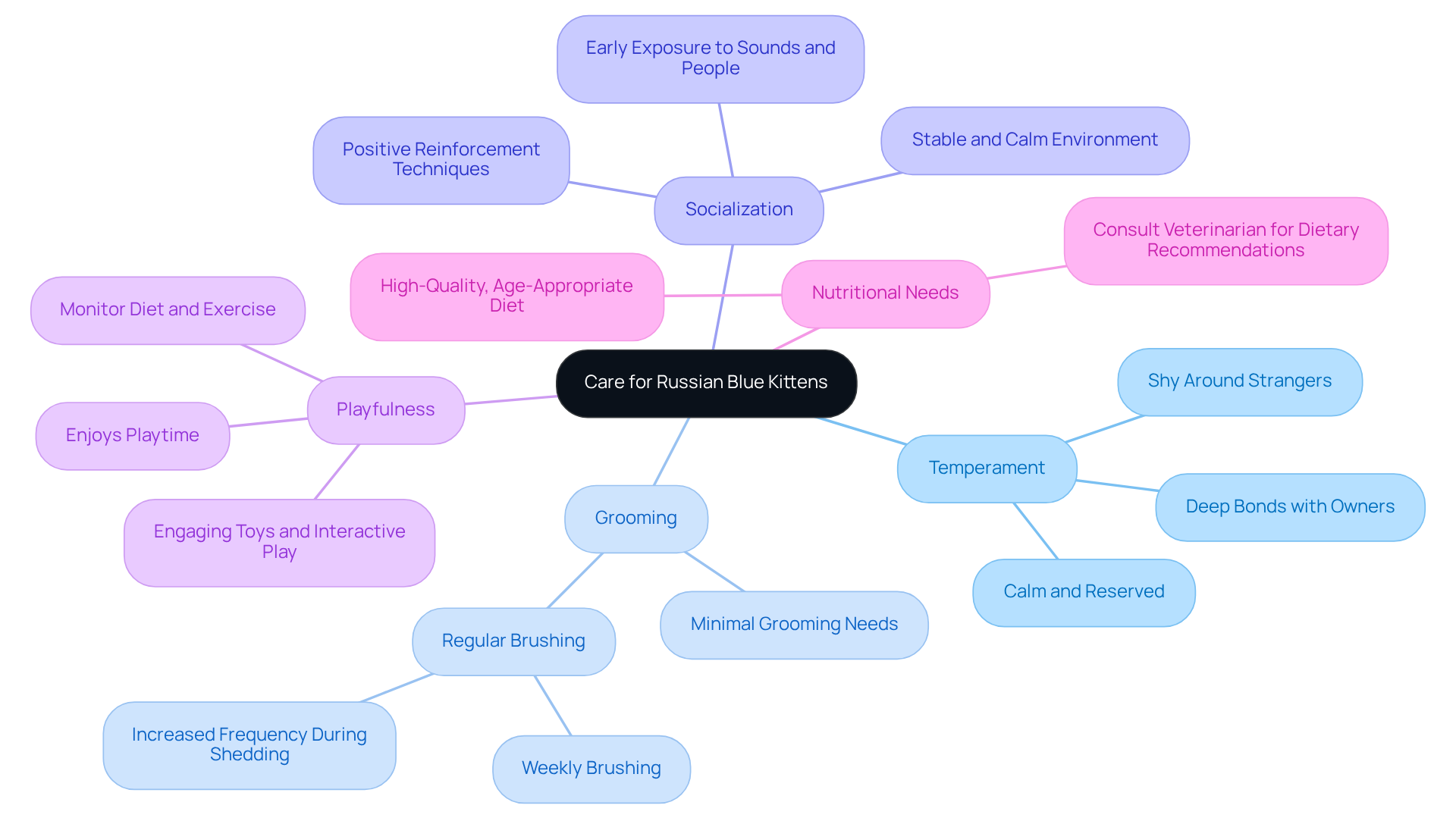
Establish a Proper Diet and Nutrition Plan
To ensure your kitten, specifically a Russian Blue kitten, thrives, it’s important to embrace some essential dietary guidelines that reflect your love and care for them.
-
High-Quality Kitten Food: When selecting a premium kitten food, prioritize options that list meat as the primary ingredient. It’s vital to choose foods rich in protein and essential nutrients, as these are crucial for supporting their rapid growth and development. A high-protein diet is especially important for young felines of this breed, as it promotes muscle development and energy levels. Consider trusted brands like Royal Canin, Blue Buffalo, and Hill’s Science Diet, which are known for their high-quality formulations tailored specifically for kittens.
-
Feeding Schedule: Establishing a consistent feeding routine by providing three to four small meals daily can make a significant difference. This organized method helps to prevent overeating, a common concern that can lead to obesity in Blues due to their hearty appetite. It’s best to avoid free-feeding, as this allows you to maintain control over their dietary intake and ensure they are getting just what they need.
-
Hydration: Remember to ensure fresh water is always available for your kitten. Incorporating wet food into a Russian Blue kitten’s diet can enhance hydration, which is particularly important as they may be prone to urinary issues. A mix of moist and dry food can provide balanced nourishment and variety, ensuring they remain hydrated while also promoting their oral well-being.
-
Monitor Weight: Regularly assessing your young cat’s weight and adjusting their food portions accordingly is a proactive strategy that aids in preventing obesity and promotes general well-being. Consulting with your veterinarian can help determine appropriate serving sizes based on their age, size, and activity level. Additionally, be cautious to avoid giving your feline, known for its lovely grayish coat, any dangerous foods such as chocolate, onions, garlic, and grapes, which can lead to serious health issues.
By adhering to these guidelines, you can assist your feline youngling in developing into a healthy and vibrant adult cat, reflecting the love and care you have for them.
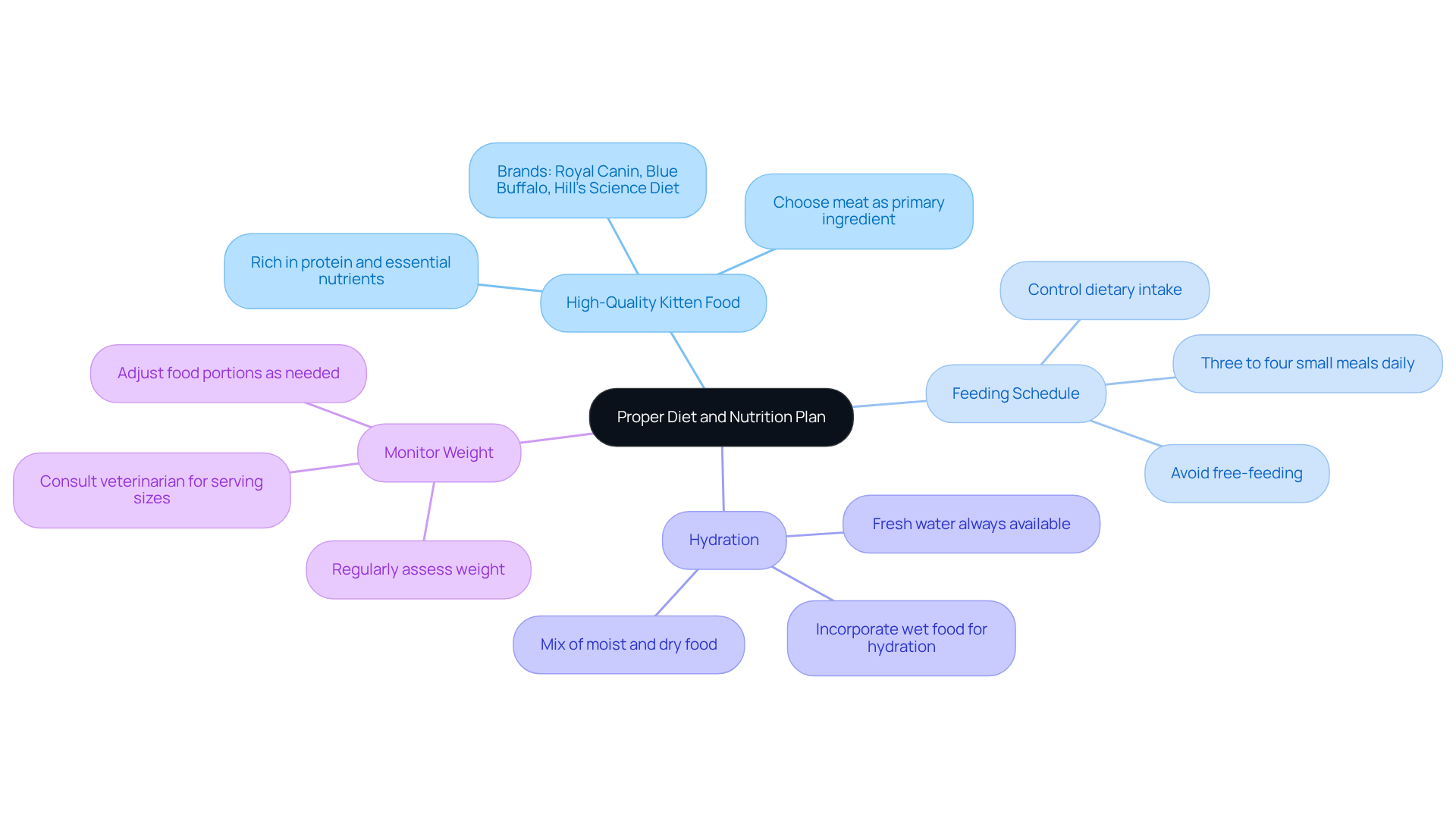
Incorporate Socialization and Exercise into Daily Routines
To promote a well-rounded lifestyle for your kitten, specifically the Russian Blue kitten, it’s essential to incorporate nurturing practices into their daily routine.
Playtime: Engaging your kitten in interactive play sessions is crucial. Using toys like feather wands or laser pointers, aim for at least 20-30 minutes of active play each day. This not only keeps them physically fit but also stimulates their minds. Regular play exercises their natural predatory instincts and strengthens the bond between you and your young cat. It’s heartening to know that 47% of cat owners report playing with their cats regularly, underscoring the significance of integrating play into their daily lives.
Socialization: Gradually introducing your young cat to various environments, people, and pets is vital. Positive experiences during these interactions foster confidence and help reduce anxiety. Socialization is especially important for a Russian Blue kitten, as it nurtures adaptability and a friendly demeanor. As Dr. Ernie Ward beautifully puts it, “When they’re young, kitty cats are going to be much more active and playful, just like people.”
Safe Exploration: Creating a secure space for your kitten to explore can greatly enhance their development. Establishing a cat tree or shelves for climbing allows a Russian Blue kitten to satisfy its natural curiosity and enjoy perching, which is a favored activity among Blues. This exploration is essential for their physical and mental growth, helping to cultivate a stimulating environment that encourages more play and discovery.
Routine: Establishing a consistent daily routine that includes playtime, feeding, and quiet time is key. This structure helps the Russian Blue kitten feel secure, minimizing anxiety and allowing it to thrive in its surroundings. Consistency in their schedule is crucial for their overall well-being. However, busy pet owners may encounter challenges such as lack of time or energy. Recognizing these barriers and discovering gentle methods to incorporate play and social interaction into your daily routine can significantly enhance your pet’s quality of life.
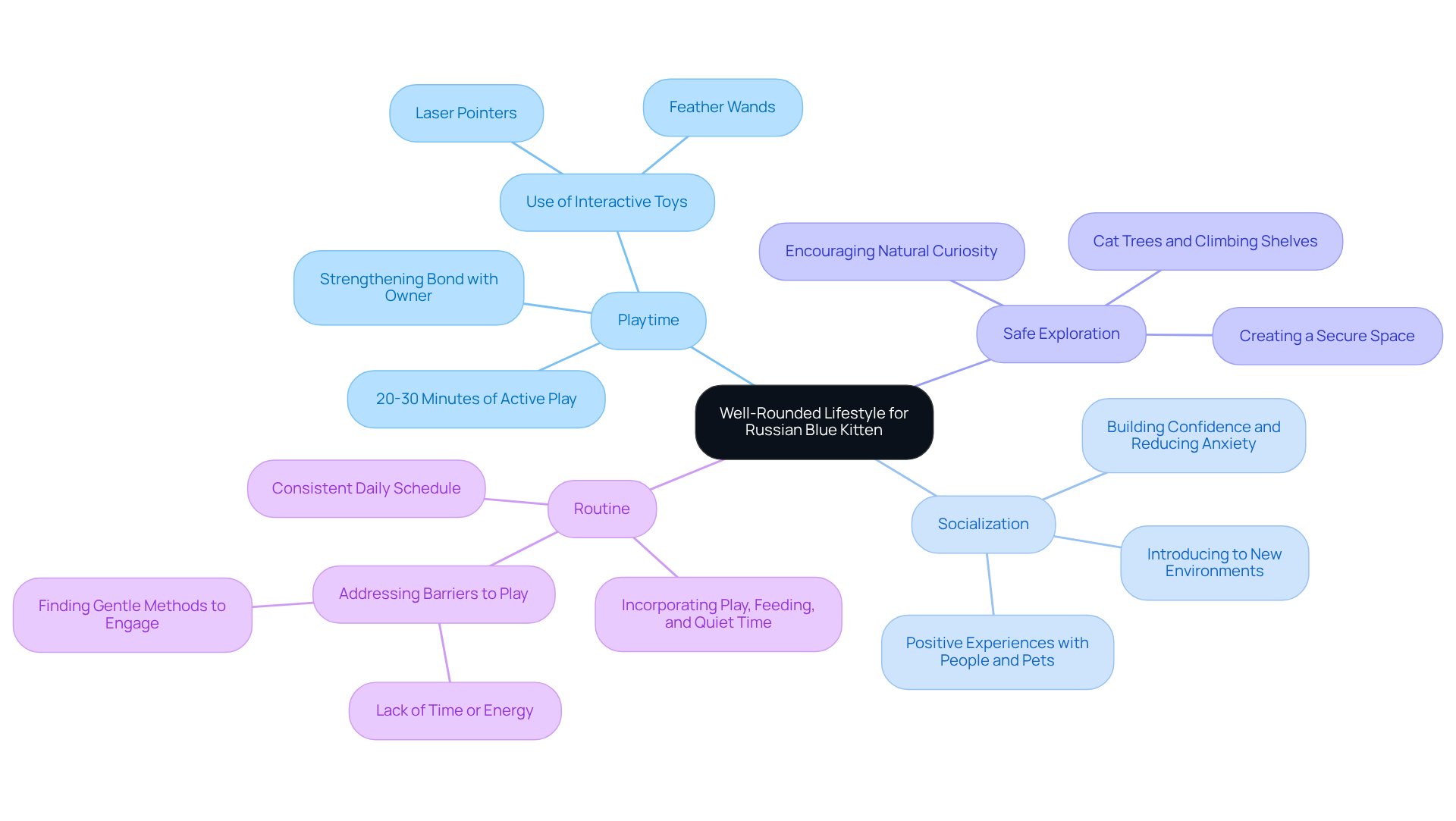
Monitor Health and Schedule Regular Veterinary Care
To ensure the health and well-being of your beloved Russian Blue kitten, it’s essential to follow these nurturing guidelines:
-
Regular Vet Visits: Scheduling veterinary check-ups every 3-4 weeks during the initial months is crucial for your kitten’s development. Young cats are particularly vulnerable to illnesses due to their still-maturing immune systems. After those early months, yearly check-ups are usually sufficient, but don’t hesitate to consult your veterinarian for personalized advice tailored to your kitten’s specific needs. Remember, the average cost of an initial examination ranges from $40 to $60, so it’s wise to plan for this in your budget.
-
Vaccinations: Ensuring your young cat receives all necessary vaccinations is vital for protecting them against common feline diseases. A standard vaccination schedule for Russian Blue kittens incorporates the FVRCP vaccine at 6-8 weeks, followed by boosters at 10-12 weeks and 14-16 weeks. Additionally, the Rabies vaccine is legally required by 14-16 weeks of age. Discuss this timeline with your veterinarian to ensure it aligns with your kitten’s health needs. Vaccines typically cost between $25 and $50 each, making it important to budget for these essential expenses. As veterinarian Katie Grzyb wisely notes, “Monitoring for any side effects after vaccinations is essential to ensure your young cat’s well-being.”
-
Dental Care: Establishing a dental care routine from the start is a wonderful way to support your kitten’s overall health. Regularly cleaning their teeth and providing dental treats or toys can significantly enhance their oral well-being, helping to prevent future dental issues.
-
Monitor Behavior: It’s important to vigilantly observe your young cat’s behavior and overall well-being. Any noticeable changes in appetite, energy levels, or litter box habits should be discussed promptly with your veterinarian. Early detection of potential health issues can lead to more effective treatment. Keep in mind that mild side effects from vaccinations, such as tiredness and soreness at the injection site, are common, while more severe reactions, though rare, may include facial swelling or difficulty breathing.
By following these essential steps, you can help ensure that your kitten, specifically a Russian Blue kitten, grows into a healthy and happy adult cat, surrounded by the love and care they deserve.
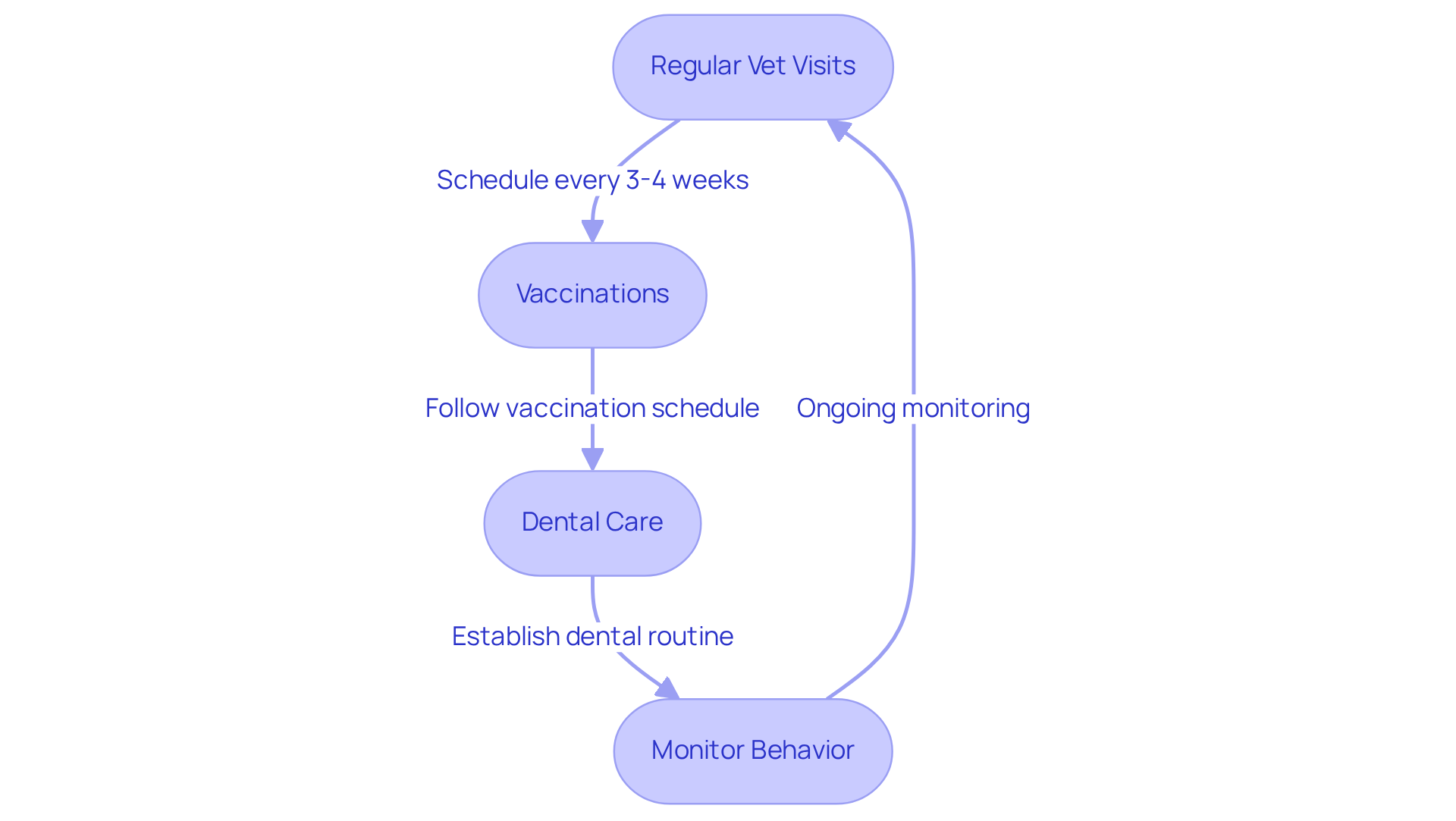
Conclusion
Caring for a Russian Blue kitten is not just a responsibility; it’s a heartwarming journey filled with opportunities to bond and nurture. These affectionate cats bring immense joy to their owners, yet they also have specific needs that deserve our attention. By understanding their unique requirements, we can create an environment where they not only survive but truly thrive. This encompasses grooming, nutrition, socialization, and health monitoring, all essential for fostering a nurturing atmosphere that allows your Russian Blue to flourish.
Key insights to consider include:
- The necessity of a balanced diet rich in high-quality protein
- The importance of establishing a consistent feeding schedule
- Ensuring they stay hydrated
- Regular playtime and socialization, which are vital for their emotional well-being
- Routine veterinary care to safeguard their health against common feline diseases
- Creating a structured daily routine to help mitigate anxiety and support their overall development
Ultimately, the love and attention you provide to a Russian Blue kitten will lay the foundation for a happy and healthy adult cat. By implementing these essential care steps, you not only enhance your kitten’s quality of life but also deepen the bond you share. Taking the time to truly understand and meet the needs of this beautiful breed is an investment that promises countless moments of joy and companionship. Remember, you are not alone in this journey; your commitment to their care is what makes all the difference.
